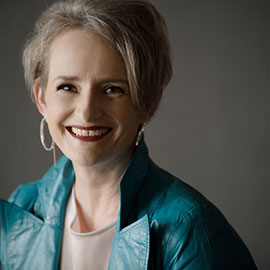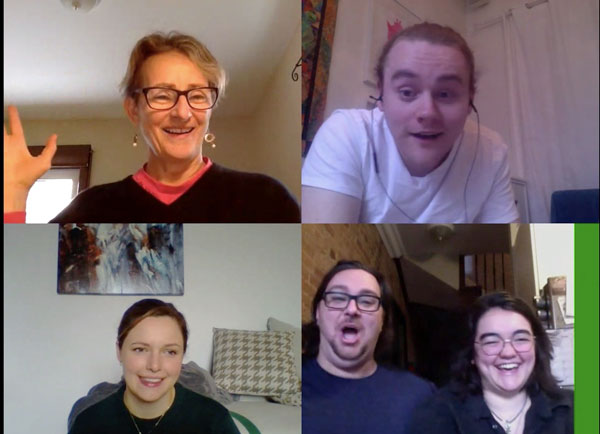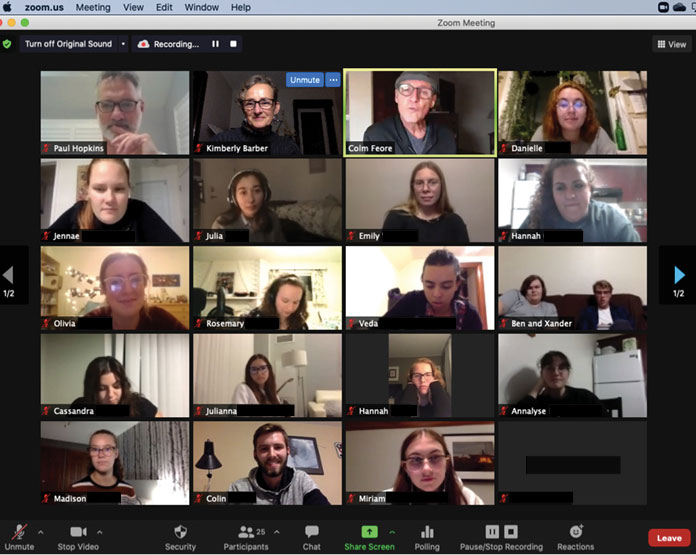We use cookies on this site to enhance your experience.
By selecting “Accept” and continuing to use this website, you consent to the use of cookies.

“There’s been a tremendous outpouring of creativity that’s been really exciting to witness,” says Kimberly Barber, Laurier’s Faculty of Music’s associate dean, external and voice professor. She’s talking about Laurier music students, and their experiences transitioning to an online learning environment.
Barber, a self-described optimist and “cheerleader for the Faculty of Music” can list many benefits to the otherwise daunting and strange experience of teaching music through a computer screen.
“In the remote environment, even if I’ve got my headphones on, and you’ve got your fancy mic, I am not going to get the same acoustical experience as I would if we were in the same room together,” says Barber. This limitation requires Barber to rely more on the student’s self-analysis than her own ear, resulting in increased responsibility and self-awareness for the developing musician.
She thinks this is a good thing.
"As music instructors we rely a lot on being directly in the same acoustical environment with the student and being able to observe them in three dimensions. Sometimes we come to rely on those things too heavily,” she says. “It becomes a shortcut for us, like I listen to the sound, I respond with an idea, I give it to the student, and there’s that back and forth, but it’s a lot of me telling, and the student simply doing what I’ve said, without necessarily reflecting.”
Acknowledging that this classical method does feel very spontaneous and dynamic, Barber notices that that the new limits created by online learning can actually deepen student skill.
“The students,” she says, “are becoming much more adept at recognizing when things are not right, already by themselves, and they’re becoming much more articulate about what they experience and do, and they’re taking more ownership of their own experience.”

Kimberly Barber top left, pictured with (left to right, clockwise, River Guard (Bmus '17, OpDip '20), Midori Marsh (BMus '17), Chad Quigley (BMus '18) and Jamie Groote (BMus '16, OpDip '18), Laurier Music alumni and panelists for “Life after Laurier” for opera students, reflecting on the many paths they have pursued since graduation.
And that’s not the only new skill students are developing. Because students cannot perform live with their collaborative pianists regularly, they are provided with a pre-recorded backtrack to practice with. Beyond the extra practice they are able to gain by having 24/7 access to the track, Barber also notices that pre-recorded tracks are forcing students to recognize the ways that the pianists often “cover” for student error.
“Students can’t rely on the pianist to be waiting for them, listening for their breathing,” says Barber, referring specifically to her voice students, although this applies more widely to any musician working in collaboration. “They have to really be responsible and step up, because the pianist is not waiting for them if they take two bars of rest instead of one, or they sing an eighth note instead of a quarter note.”
“If it goes off the rails because the student is wrong, the pianist is not there save their skin!” she laughs. “A lot of students are noticing more and more, and they say, oh my goodness, like how many times did the pianist actually save me and step up to cover up my failings?”
The pianists are also noticing the benefits of the backtrack. When the students work in the remote learning environment with the pianist and Barber, the pianists now have an opportunity to fully engage with the listening process. Where typically they are half listening and half focusing on their playing, now, there is opportunity to deeply listen first to the student performing to the track, before going on to a remote “live” performance in real time.
Barber is also excited about the creativity students and instructors show in their digital assignments. She highlights a recent Opera class assignment in which students were required to record a one-minute video with at least two camera angles in which they recited a Shakespearean sonnet.
“What some of these students came up with was just astonishing,” says Barber, “And I think they’ve all learned a tremendous amount.” Some students acted out whole scenes, bringing in friends and family members; others put together “really spectacular” footage with voiceover and music tracks.
Digital learning also provides an opportunity for the Faculty to offer something special to students. In the fall of 2020, students were treated to an “Actor’s Studio” style interview featuring Canadian film, television and stage actor Colm Feore. Feore talked about his creative processes and what it’s like being an actor in the time of COVID-19, and the skills that he took from the theatre stage into film and television acting. He also occasionally burst into a monologue from Romeo and Juliet, and Hamlet. The students were thrilled.

Students attended Colme Feore's interview on Zoom, hosted by Canadian actor Paul Hopkins, who is also their acting and directing coach.
For every high, there is a low, and given the challenges of these times, there are definitely lows. Students miss playing together in person – and Barber herself acknowledges she experiences days when she feels stressed out and exhausted by the challenges. She worries about the future of music, about her students’ careers, and longs for the return of live music. And she’s hearing the same thing from musicians within and beyond the Faculty, across the community.
These lows only reinforce her commitment to focusing on the wins.
“There’s a lot of grief, a lot of concern,” she says. “So I’m really always trying to find what are the positive things.” In her role as associate dean, musician and community member, she wants to be a leader and “a bit of a beacon” of hope.
“I think it’s really critical that we take this time and recognize what are the wins, what are the takeaways, what can propel us forward,” she says.
The Faculty continues to support student wellness, as well as giving students new learning opportunities. The Faculty offers “Tea Time,” a weekly virtual drop-in, as well as drop-in chats with some staff and the Acting Dean, and many course instructors offer more check-in opportunities within their classes. Masterclasses can use the spotlight feature to highlight individual performance, and after they are unmuted, the class can give lots of applause. The collaborative pianist Barber works with has fun selecting Zoom backgrounds to fit the music performed that day. Instructors work hard to help students make the connections between the value of the digital environment and their future in a world that will be increasingly screen-filtered, teaching skills familiar to television and film actors like how to project and connect emotionally through a screen. Digital environments allow the Faculty to open up more, bring in the world, and sharing with the world, which gives everyone a richer experience. The Faculty ponders which skills and learnings they’ll bring forward when we return to live performances.
Barber’s been passionate about music since she was a young child. A high school teacher who believed in her during high school set her on a road to becoming a world-class opera singer. Other inspiring figures helped her build the confidence to teach. She’s grateful for the individuals who pushed her forward, challenged her, and opened her up to new experiences.
Now it’s her turn to guide Laurier’s promising young musicians through the new experiences that come with both any young musician’s post-secondary musical education and a world where we’re all learning how to learn in new ways.